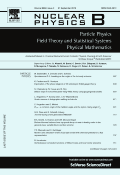
NUCLEAR PHYSICS B
Scope & Guideline
Advancing Knowledge in High Energy Physics
Introduction
Aims and Scopes
- Quantum Field Theory and Particle Physics:
This area encompasses research on quantum field theories, including the Standard Model, extensions such as supersymmetry, and other theoretical frameworks that describe particle interactions. - Gravitational Physics and Cosmology:
The journal features studies related to black holes, gravitational waves, and cosmological models, emphasizing the interplay between gravity and quantum mechanics. - Dark Matter and Neutrino Physics:
Research on the nature of dark matter, its candidates, and the role of neutrinos in the universe is a significant focus, reflecting the ongoing quest for understanding these elusive components. - Mathematical Physics and Integrable Systems:
The journal includes contributions that explore the mathematical structures underlying physical theories, with particular attention to integrable systems and their applications in theoretical physics. - String Theory and Higher-Dimensional Models:
Studies in string theory, M-theory, and related higher-dimensional models are central, providing insights into unifying frameworks for fundamental forces.
Trending and Emerging
- Quantum Gravity and Black Hole Physics:
There is a growing body of work addressing the intersection of quantum mechanics and general relativity, particularly focusing on black hole thermodynamics, Hawking radiation, and the information paradox. - Dark Matter Physics:
Significant attention is being paid to various dark matter candidates and detection strategies, reflecting an increased urgency to uncover the nature of dark matter in the universe. - Neutrino Mass and Flavor Physics:
Research on neutrino masses, oscillations, and their implications for new physics is gaining momentum, indicating a robust interest in understanding the role of neutrinos in cosmology and particle physics. - Higgs Physics and Beyond:
With the Higgs boson discovery, there is a renewed focus on its properties, interactions, and implications for new physics, including extensions of the Standard Model. - Quantum Information and Entanglement in Gravity:
Emerging studies are exploring the connections between quantum information theory and gravitational physics, particularly the implications of entanglement in black hole thermodynamics.
Declining or Waning
- Classical Gravity Models:
Research specifically focused on classical gravity models, such as general relativity without quantum considerations, has seen a decrease, suggesting a shift towards more quantum-inclusive approaches. - Non-perturbative Approaches:
While previously a significant focus, non-perturbative methods in quantum field theory appear less frequently, possibly due to the growing interest in numerical and computational techniques. - Phenomenological Studies of Baryon Decays:
The frequency of studies on specific baryon decay processes has declined, indicating a possible shift in interest towards broader theoretical frameworks rather than detailed phenomenological analyses. - Low-Energy Effective Field Theories:
There is a noticeable decrease in the number of papers focusing on low-energy effective field theories, possibly as researchers pivot towards more fundamental theories and high-energy phenomena.
Similar Journals
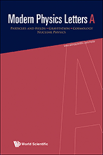
MODERN PHYSICS LETTERS A
Illuminating the Path of Modern Physics ExplorationMODERN PHYSICS LETTERS A, published by World Scientific Publishing Co Pte Ltd, is a distinguished journal in the field of physics that serves as a pivotal platform for researchers, professionals, and students alike. With ISSN 0217-7323 and E-ISSN 1793-6632, the journal has gained international acclaim for its contributions to Astronomy and Astrophysics as well as Nuclear and High Energy Physics. The journal is ranked in Q3 for both Astronomy and Astrophysics and Nuclear and High Energy Physics, showcasing its relevance in these areas, while also achieving a Q2 ranking in the broader category of Physics and Astronomy (miscellaneous). Spanning from 1996 to 2024, MODERN PHYSICS LETTERS A promotes open dialogue and dissemination of pioneering research findings and innovative theories. While the journal operates without an open access option, its rich content is easily accessible through various academic databases, ensuring that vital research is shared widely among the scientific community. Situated in Singapore, this journal plays an essential role in the continuous advancement of the physics discipline, fostering collaboration and knowledge sharing among global researchers.

EUROPEAN PHYSICAL JOURNAL C
Empowering Global Collaboration in ScienceEUROPEAN PHYSICAL JOURNAL C (EPJ C), published by SPRINGER, stands as a premier platform for innovative research in the domains of Physics and Engineering. With its Open Access policy established in 2014, EPJ C ensures that groundbreaking findings are readily available to the global scientific community, enhancing accessibility and collaboration. The journal, indexed in prestigious databases, boasts an impressive impact factor and ranks within the Q1 category for both Engineering and Physics and Astronomy, placing it among the top-tier journals in these fields. Celebrated for its rigorous peer-review process, EPJ C offers a wide-ranging scope encompassing various topics in particle physics, quantum field theory, and related interdisciplinary studies. Its consistent publication since 1991 has fostered a vibrant community of researchers dedicated to advancing knowledge and innovation in physics and engineering. Join the scholarly discussion and contribute to the cutting-edge research made possible through EPJ C's esteemed platform.
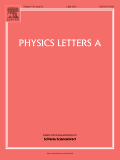
PHYSICS LETTERS A
Pioneering Insights in Physics and AstronomyPhysics Letters A is a renowned scientific journal published by Elsevier, dedicated to the field of physics and astronomy. Established in 1963, it has continuously evolved, offering a platform for the swift dissemination of significant research findings in various branches of physics. As of 2023, it holds a commendable Q2 ranking in the category of Physics and Astronomy (miscellaneous) and ranks 69th out of 243 journals in the same domain according to Scopus, positioning itself in the 71st percentile of academic impact. With its comprehensive scope, Physics Letters A provides a vital resource for researchers, professionals, and students, facilitating academic discourse and advancing knowledge across the field. Although it does not currently offer Open Access options, its rigorous peer-review process ensures high-quality content. It is centrally located in Amsterdam, Netherlands, and continues to be an essential outlet for innovative contributions to the physics community through the year 2024 and beyond.
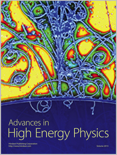
Advances in High Energy Physics
Connecting Researchers to the Pulse of High Energy PhysicsAdvances in High Energy Physics, published by HINDAWI LTD, is a premier open-access journal dedicated to the progressive field of Nuclear and High Energy Physics. With an ISSN of 1687-7357 and an E-ISSN of 1687-7365, this journal has been at the forefront of scientific discourse in high energy physics since its inception in 2007. The journal is notable for its impact within the community, currently holding a Q2 ranking in 2023 and positioned at #36 out of 87 in its category according to Scopus, highlighting its significant contribution to ongoing research and advancement in the field. Its accessible nature enables researchers, professionals, and students to engage with cutting-edge findings that shape our understanding of the universe. Spanning publications from 2010 through 2024, Advances in High Energy Physics serves as an invaluable resource for those looking to stay informed about the latest developments and methodologies in high energy physics across the globe.

Journal of Cosmology and Astroparticle Physics
Charting New Frontiers in Astroparticle ResearchThe Journal of Cosmology and Astroparticle Physics (ISSN: 1475-7516) is a premier publication in the field of astronomy and astrophysics, dedicated to advancing our understanding of the cosmos through innovative research. Published by IOP Publishing Ltd in the United Kingdom, this journal has established itself as a vital resource for researchers, professionals, and students alike, with an impressive Scopus rank of #11/90, placing it in the top 12% of its field. The journal aims to foster the dissemination of groundbreaking studies related to cosmology, dark energy, particle physics, and the universe's fundamental structure, making it a key player in shaping contemporary astrophysics discourse. With a Category Quartile of Q2 as of 2023, it continues to attract high-quality contributions that enhance scholarly dialogue. As an accessible platform, it engages a diverse audience interested in the frontiers of astrophysical research, encouraging collaboration and knowledge sharing among the global scientific community.

Physics of Particles and Nuclei Letters
Unveiling the Mysteries of Particles and NucleiPhysics of Particles and Nuclei Letters, published by PLEIADES PUBLISHING INC, serves as a pivotal platform for the dissemination of cutting-edge research in the domains of particle and nuclear physics. With an ISSN of 1547-4771 and an E-ISSN of 1531-8567, this journal has been actively contributing to the scientific community since its inception in 2006 and continues to be influential, with a convergence period extending to 2024. While its open access options are limited, the journal is recognized for its rigorous peer-review process and commitment to quality, as reflected in its Scopus rankings across multiple categories, including a Q3 in Nuclear and High Energy Physics and Radiation in 2023. The journal is positioned to be a vital resource for researchers aiming to bridge theoretical understanding with practical applications in these highly specialized fields, fostering advances that resonate within atomic and molecular physics, radiology, and beyond. Its relevance continues to grow as the global scientific community seeks innovative solutions to complex problems in modern physics.

Gravitation & Cosmology
Unraveling Cosmic Dynamics and Gravitational ForcesGravitation & Cosmology is a vital academic journal founded to explore the profound concepts of gravitation and the dynamics of the universe. Published by MAIK NAUKA/INTERPERIODICA/SPRINGER, this journal features a comprehensive range of research articles, reviews, and theoretical insights that advance the field of astronomy and astrophysics. With a current impact factor reflective of its esteemed contribution, Gravitation & Cosmology operates within the upper tier of its discipline, classified as Q3 in Astronomy and Astrophysics for 2023. Although not an open-access publication, the journal fosters a vibrant community of scholars and practitioners by providing rigorous peer-reviewed content accessible through various academic platforms. Covering converged years from 2008 to 2024, this journal serves as an indispensable resource for anyone keen on deepening their understanding of gravitational phenomena and cosmological theories. Researchers, professionals, and students alike will find valuable insights and innovative research that push the boundaries of contemporary astrophysical knowledge.
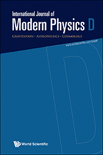
INTERNATIONAL JOURNAL OF MODERN PHYSICS D
Connecting Ideas in Space and Planetary ScienceWelcome to the INTERNATIONAL JOURNAL OF MODERN PHYSICS D, a premier publication dedicated to the advancement of knowledge in the fields of Astronomy and Astrophysics, Mathematical Physics, and Space and Planetary Science. Published by WORLD SCIENTIFIC PUBL CO PTE LTD in Singapore, the journal boasts an impressive impact, being ranked Q2 in Astronomy and Astrophysics and Mathematical Physics, and Q3 in Space and Planetary Science. With a converged publishing timeline from 1996 to 2024, this journal provides a vital platform for researchers and professionals to disseminate their findings, engage with cutting-edge research, and explore emerging ideas in modern physics. Although it operates under a traditional access model, the rigorous peer-reviewed process ensures that only the highest quality research contributes to the collective understanding of our universe. Join us in advancing the frontiers of physics and astronomy!
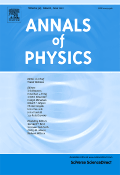
Annals of Physics
Elevating the discourse in Physics and Astronomy since 1957.Annals of Physics is a premier journal published by Academic Press Inc Elsevier Science, specializing in the expansive field of Physics and Astronomy. Since its inception in 1957, this journal has played a pivotal role in disseminating high-quality research and advancements across various sub-disciplines of physics. With a notable impact factor making it rank in the Q1 category for 2023, it stands among the top tier of scholarly publications, specifically sitting at Rank #63 out of 243 in the field, placing it in the 74th percentile according to Scopus metrics. Researchers are encouraged to submit their findings to reach a broad audience without the constraints of Open Access fees, promoting extensive visibility within the academic community. As we look ahead to 2024, Annals of Physics continues to be an essential resource for professionals, students, and academics striving to advance the frontiers of knowledge in physics and astronomy.
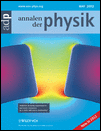
ANNALEN DER PHYSIK
A Legacy of Excellence in Scientific DiscourseANNALEN DER PHYSIK, a prestigious journal published by WILEY-V C H VERLAG GMBH, stands as a cornerstone of the field of physics and astronomy since its inception in 1799. With an ISSN of 0003-3804 and an E-ISSN of 1521-3889, this journal provides a platform for innovative research and critical discourse across various domains of physics. Annalen der Physik is currently ranked in the Q2 category for general physics and astronomy, occupying rank #76 out of 243 in Scopus, placing it within the 68th percentile. This indicates its significant impact and the quality of research it publishes. Although the journal does not offer Open Access options, its robust historical lineage and ongoing contributions ensure that it continues to be an essential resource for researchers, professionals, and students alike. For those seeking to stay at the forefront of contemporary physics research, ANNALEN DER PHYSIK represents a vital source of knowledge, innovation, and scholarly communication.